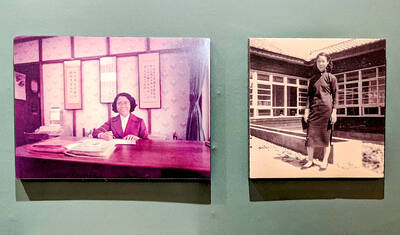The Taiwan International Children's TV and Film Festival (
It is not just an event for children, however, and the films do not look child-like. In fact, the movies presented at the festival offer an opportunity for both adults and children to see the world of film in a way that makes movies more accessible in our daily lives.
The opening film Bibi Blocksberg is a German version of Harry Potter, where 12-year-old witch Bibi inherits magical powers from her mom Babara and saves two boys from a fiery death. She is given a crystal ball by senior witches and becomes an official witch. As she and Babara fly on their brooms to the ceremony, there are people unhappy with Bibi's official title. One is the jealous, evil-hearted witch Rabia and the other is Bibi's dad, Babara's husband, who, as a non-witch, is sick of supernatural powers.

This is a movie where you see witches using the toilet, who love watching TV dramas and being modern housewives, yet still have magic power.
On a similar theme, French animation screens Kirikou and Sorceress, in which Kirikou is a kid from an African village upon which a sorceress called Karaba has cast a terrible spell. Kirikou may be small but he is destined to get rid of the spell and save the water from drying out.
Miss Entebbe is a feature drama from Israel, which centers on children but talks about political conflict in the adult world. Thirteen-year-old Israeli girl Noa believes she can free her friend's mom, who is held hostage, by kidnapping an Arab boy. She and her neighboring kids then follow the adults' patterns of behavior. But while entering the turmoil of political conflict and hatred, they discover that the solution is not to be found in the violent adult arena, but rather within their own hearts.
There are also screenings of films and animations that are made by or with children. Belgium filmmaker Jean-luc Slock presents six of his peculiar projects. Slock and his team from the Camera Enfants Admis in Belgium travels around the world, finding a group of children and choosing a topic to make a film. Water is Life is a cute animation he made with 40 kids from Burkina Faso. In a village without water, electricity and TV, villagers' daily water use depends on one small lake. They fish in it, swim in it, water the flowers and wash their clothes with the lake's waters. But people also dump garbage and toxic waste in it.
Belgium is not the only place where children are allowed to be film directors, Taiwan has something similar. At the film festival, 10 such projects will be screened. Sixty elementary school teachers, together with their students, proposed 10 story ideas and the projects were supervised by 10 Taiwanese filmmakers. There are dramas, doll animations and documentaries.

Following the shock complete failure of all the recall votes against Chinese Nationalist Party (KMT) lawmakers on July 26, pan-blue supporters and the Chinese Communist Party (CCP) were giddy with victory. A notable exception was KMT Chairman Eric Chu (朱立倫), who knew better. At a press conference on July 29, he bowed deeply in gratitude to the voters and said the recalls were “not about which party won or lost, but were a great victory for the Taiwanese voters.” The entire recall process was a disaster for both the KMT and the Democratic Progressive Party (DPP). The only bright spot for

Water management is one of the most powerful forces shaping modern Taiwan’s landscapes and politics. Many of Taiwan’s township and county boundaries are defined by watersheds. The current course of the mighty Jhuoshuei River (濁水溪) was largely established by Japanese embankment building during the 1918-1923 period. Taoyuan is dotted with ponds constructed by settlers from China during the Qing period. Countless local civic actions have been driven by opposition to water projects. Last week something like 2,600mm of rain fell on southern Taiwan in seven days, peaking at over 2,800mm in Duona (多納) in Kaohsiung’s Maolin District (茂林), according to

Aug. 11 to Aug. 17 Those who never heard of architect Hsiu Tse-lan (修澤蘭) must have seen her work — on the reverse of the NT$100 bill is the Yangmingshan Zhongshan Hall (陽明山中山樓). Then-president Chiang Kai-shek (蔣介石) reportedly hand-picked her for the job and gave her just 13 months to complete it in time for the centennial of Republic of China founder Sun Yat-sen’s birth on Nov. 12, 1966. Another landmark project is Garden City (花園新城) in New Taipei City’s Sindian District (新店) — Taiwan’s first mountainside planned community, which Hsiu initiated in 1968. She was involved in every stage, from selecting

As last month dawned, the Democratic Progressive Party (DPP) was in a good position. The recall campaigns had strong momentum, polling showed many Chinese Nationalist Party (KMT) lawmakers at risk of recall and even the KMT was bracing for losing seats while facing a tsunami of voter fraud investigations. Polling pointed to some of the recalls being a lock for victory. Though in most districts the majority was against recalling their lawmaker, among voters “definitely” planning to vote, there were double-digit margins in favor of recall in at least five districts, with three districts near or above 20 percent in